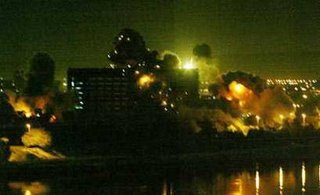White House Projectionist New Most Powerful Man in Washington

When Bush won a second term, I needed to shift my mental construct to rationalize his reelection. I could accept staunch Republicans voting for him in hopes that his presence in the White House would further the Party platform, help raise money for and get other Republicans elected (remember, this was a few years ago). I just couldn't accept all the people who said they voted for him because he was "doing a good job." So...
It was then that I started thinking of Georgie as a character in a musical comedy about Pol Pot, not the man in charge of the "noo-cu-lar" codes. After all, folks just love musical comedy... I know it sounds odd but it I've found it to be a highly effective coping mechanism.
Anyway... today, the LA Times reported that Bush will create the world's largest marine protected area. A total of 140,000 square miles of Pacific Ocean surrounding a string of islands and atolls that stretch from the Hawaiian Islands to the Midway Atoll.
I dive. I feel strongly about the health of our oceans. So, I think it's a good idea and hope that concessions will be developed for the native populations that have always depended on these waters for food. But Bush attempting to preserve the environment? How confusing... I've never heard it speculated that there exist "vast oil reserves" off Hawaii; but an act of real environmental concsiousness... it didn't exactly seem in character.
Evidently, the turning point for this "greener" Bush came in April, when he sat through a 65-minute private White House screening of a PBS documentary that highlighted the beauty and threats facing the archipelago's waters and its nesting seabirds, sea turtles and puppy-dog-eyed monk seals, all threatened by extinction.
According to White House officials and others in attendance, the documentary seemed to really catch Bush's interest. Reportedly, he "popped up from his front-row seat after the screening; congratulated filmmaker Jean-Michel Cousteau, son of the late underwater explorer Jacques Cousteau; and urged the White House staff to get moving on protecting these waters."
"He was enthusiastic," Cousteau said. "I think he really made a discovery — a connection between the quality of our lives and the oceans."
Well, maybe this week, the White House projectionist could show "The War Tapes;" the first Iraq War documentary filmed entirely by the soldiers themselves. For good measure and to ensure Bush's attention, they could also show cartoons and serve popcorn and "Sno-Caps." Then, perhaps tomorrow, I can read in the LA Times that Bush is ending his terrorist breeding program; oops, I mean war, in Iraq.
In George Washington's farewell address, he counseled Americans to "avoid the necessity of those overgrown military establishments, which under any form are inauspicious to liberty, and which are to be regarded as particularly hostile to republican liberty." How many more times does America need to demonstrate that we can't micromanage the world and that we just don't understand other cultures? Korea, Iran, Vietnam, Afghanistan, Chile, Guatemala... consider what calamities arose in those places from American intervention and the resulting political vacuums. It's quite clear that there are still those in power that do not fully grasp the prospect for blow-back, at home and abroad, from our policy decisions and military actions.
Woe, the musical comedy...



